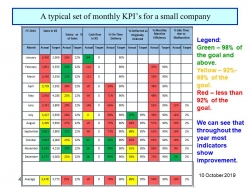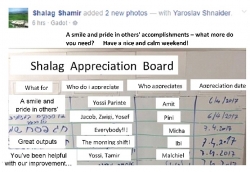Links to articles about employees’ management can be found at the end of the article.
My last article running a business during wartime focused on three subjects: employees, cash flow and strategic planning. The article discussed how to cope with a shortage or surplus of employees during crises. It focused on termination, unpaid leave of absence, forced vacations and furlough – all in accordance with the law and its updates. I also mentioned the lessons we learnt from the Covid pandemic crisis.
This article focuses on the principles of managing employees during wartime.
Sympathy, personal attention, and discipline
Sympathy
We are all very tense these days, some are more than others. I know people who stay at home to care for their spouses suffering from high anxiety. I met people who are unable to concentrate on their tasks for the high tension they experience.
Managers are required to exercise patience, be highly sensitive towards their employees and not get upset if objectives are not met.
Managers may, of course, be highly stressed themselves, but they carry the responsibility to be calm and support the employees, even when the latter fail to function and meet their targets.
An angry manager, shouting at an employee failing to meet the targets, does it to relieve his own stress. However, that is a great mistake.
Employees expect emotional support and understanding. Meeting these expectations will provide the company with opportunities to engage the employees for the long run.
Following are some examples employees posted on Twitter:
Ram Ben Zik wrote:
“It is important for me to say that I work at CyberArk. The support given by all levels of management members, to all employees, not only those who live in the south, been called out for army service or volunteer, the understanding that there are employees who find it difficult to be productive or cope with the situation - make me proud to be part of CyberArk. I am glad that this is not the only firm that supports its employees in this manner.”
Incidentally, CyberArk was rated 4th company that people wish to work for.
An employee at Digital Turbine wrote:
“I work at Digital Turbine. Total flexibility from day one. We received 2,000 NIS that we could chose to donate or take home. Managers told us, on the first day of the war, that they would understand fallbacks in productivity, and that it would be OK. Management members approach us at least once a week to enquire how they can help more and if there is anything we need. They ask for our feedback so they can do better.”
An employee working at CISCO wrote:
“CISCO has publicly identified with Israel from the first moment. Wartime allowance was given to all employees and double the amount to those in army service. 10 days off work, to cope with the situation. Between 10 and 20 paid community volunteering days. A list of nonprofit organizations was distributed among the employees for donations. CISCO doubles the contribution of every employee. Working from home is acceptable and allowed. Management understands that productivity (mainly in the south) is partial or none.”
Special attention to employees living in the south, have family members who are dead, injured or taken hostage or serving in the military reserve forces
All companies, big and small, must treat employees living in the South of Israel, have family members who were murdered, kidnapped or serving in the army reserve forces, with special care. Every Shekel management contributes to these employees will be returned in loyalty and thanks.
Small and medium size businesses: How to manage dysfunctional employees?
The situation of small and medium size businesses is complex, especially businesses whose sales have stopped, are owed money, and are striving to survive. CEOs that had to send workers home and were left with dysfunctional staff, must show sympathy.
Management tools:
- Talk to the employees. Listen to their stories and attend to their problems. Encourage them to think of new ideas to improve the business.
- Engage them to the company’s goals, involve them in problem-solving processes and consider their solutions.
- Don’t be angry. Employees who feel your anger, or worse still, are shouted at will not produce better results, especially in wartime. On the contrary, management’s anger raises antagonism, and hostility. It causes employees to break away from the company’s goals.
However, company goals and objectives must be met, even during wartime.
How to achieve good business results during wartime?
Close, personal attention
Further to management sympathy and emotional support, managers are also required to assess and monitor employees’ performance and achievements.
Monitoring daily data and keeping a close eye on performance is an excellent tool to control the situation.
It is also important to closely follow each employee’s performance of their daily duties.
In normal times, we cascade responsibility and delegate authority to lower-level managers and operators. We demand action and improvement plans to rectify situations of not meeting the objectives. We usually refrain from overseeing employees’ daily missions. However, these are not normal times. Our close attention to employees’ assignments can help them cope with the stress and execute better performance.
Discipline
Clear rules and discipline create a framework. Working within a framework makes it easier to function. It is important to explain the importance of working by the rules to everyone on site. It is necessary to follow them closely. However, workers and managers who find it difficult to abide by the rules should not be punished. Attention should be drawn to their improper conduct and the fact that management is aware of it, but they should not be penalized.
The rules to follow during crises must include: (a partial list)
- Strict registration of attendance and absenteeism, using a time clock or a designated application. Each manager must daily check the attendance registration data of the workers under his management. He must inform employees who failed to register. Every deviation from the law of working hours and rest must be immediately reported to the CEO. Management must pay attention to updates in the law during wartime.
- Exact arrival and departure times as were practiced during normal, routine times
- Strict follow up of break times
- Strict adherence to safety rules
- Clothing adjusted to the assignment requirements.
I wish to emphasize that the purpose of adhering to the rules and regulations is to create a framework within which everyone should work. Frameworks contribute to the human ability to function under stress.
Strict adherence to the rules does not mean reprehension or punishment. A careful balance between discipline and emotional support is required to enable the staff return to routine life, routine that helps employees cope and overcome some of their issues. HR managers are required to be involved. Their input is crucial to the business.
Summary and recommendations
Everyone is stressed and emotionally challenged during wartime. Some employees might have family members who were murdered, taken hostage, or still missing. Some employees have been called out to serve in the military reserve forces under the 8th order. Some have sons, daughters or spouses serving in the IDF, and some experience high anxiety to the point of dysfunction.
Management is required to be sympathetic.
Big businesses, especially those who have a strong base overseas, may find it easier to cope. Small and medium size businesses experience more hardships, because the products or services they provide are not required and sales are down.
Though these businesses find it challenging to support their employees, they should use the following tools:
- Be attentive to the employees. Listen and offer your help.
- Supervise each employee’s performance and achievements, while providing emotional and professional support.
- Adhere to the disciplinary rules and regulation, and to the law of working hours and rest.
Focusing on assignments, striving to reach targets and working by the rules, help humans cope with stress and anxiety.
Our ability to cope with crises depends on our ability to manage the delicate balance between emotional and professional needs.
Links to articles about employees’ management
- About Worker Motivation and Increased Production
- Excellence, Quality, and Increased Profits through Employees' Involvement and Responsibility
- How to create winning teams?
- Every time you yelled at me, I peed in your soup
- How to Reward Employees for Proposing improvement Measures?
- Why Do Many Managers Resist Improvement Teams and the Information they Provide?
- How to Promote Engagement and Get Employees Invested in Company Goals
- Extraordinary Management Decisions of CEOs
- The Most Common and Successful Management Methods in Israeli Industry - Results of the Managers Survey (Part I)
- The Most Common and Successful Management Methods in Israeli Industry - Results of the Managers Survey (Part II)
- How Managers Can Use Personal Goals to Achieve Company Goals
- How to fire employees the right way?
- Division – A Tool of Systematic Inventive Thinking (SIT)












 My First Book: Manage! Best Value Practices for Effective Management
My First Book: Manage! Best Value Practices for Effective Management